If you are a foreign professional, manager, or executive looking to work in Singapore, you will likely need an Employment Pass (EP). This pass allows you to live and work in the country for a specified period. However, to be eligible for an EP, you must meet certain requirements, including earning a minimum qualifying salary.
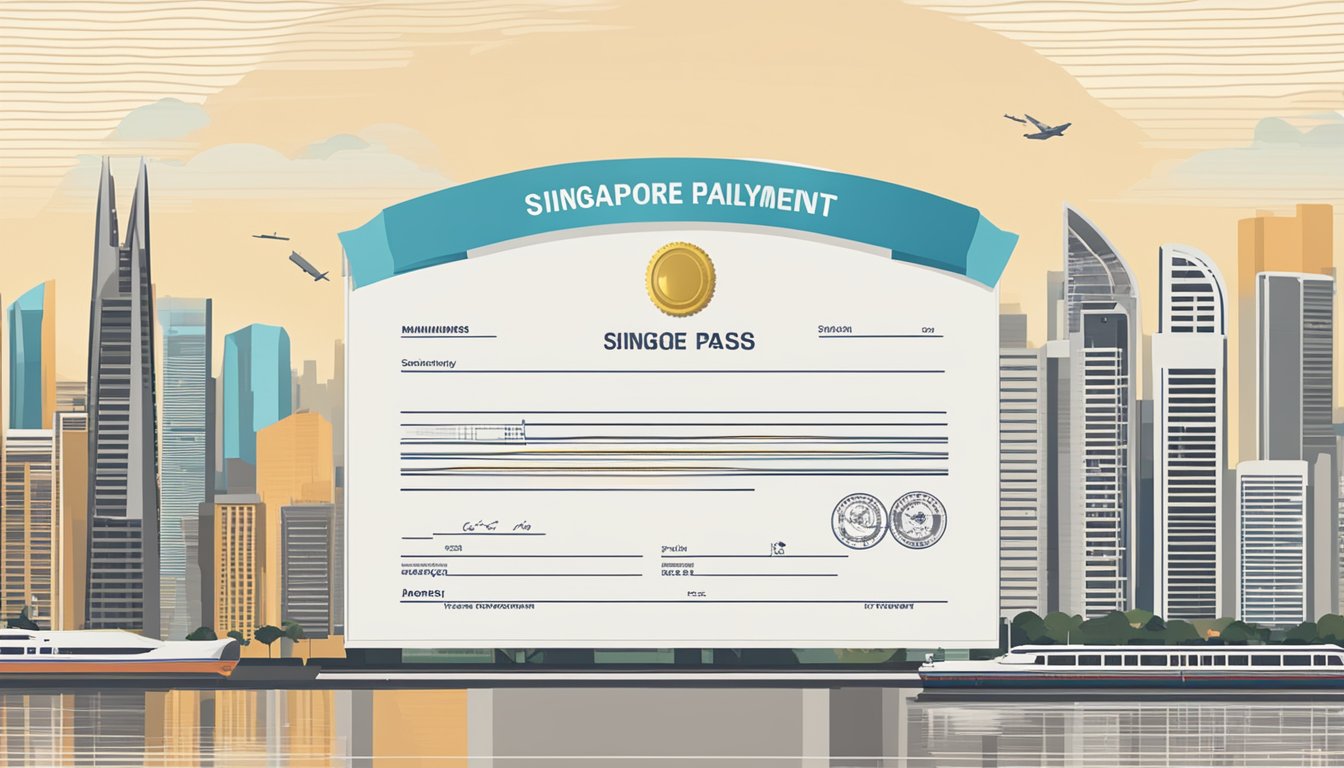
The minimum qualifying salary for an EP is benchmarked to the top one-third of local PMET salaries by age, and it starts from $5,000 per month. The salary requirement increases progressively with age, up to $10,500 for those in their mid-40s. However, candidates in the financial services sector need higher salaries to qualify. Additionally, you will need to pass the points-based Complementarity Assessment Framework (COMPASS), unless exempted.
To apply for an EP, your prospective employer must submit the application on your behalf. You can check your eligibility for an EP using the Self-Assessment Tool on the Ministry of Manpower website. If you meet the requirements, your employer can proceed with the application process. Once approved, your EP will be valid for up to two years and can be renewed thereafter.
Key Takeaways
- To be eligible for an Employment Pass (EP) in Singapore, you must earn a minimum qualifying salary benchmarked to the top one-third of local PMET salaries by age, starting from $5,000 per month.
- Candidates in the financial services sector need higher salaries to qualify for an EP.
- Once approved, your EP will be valid for up to two years and can be renewed thereafter.
Eligibility and Qualifications for Employment Pass
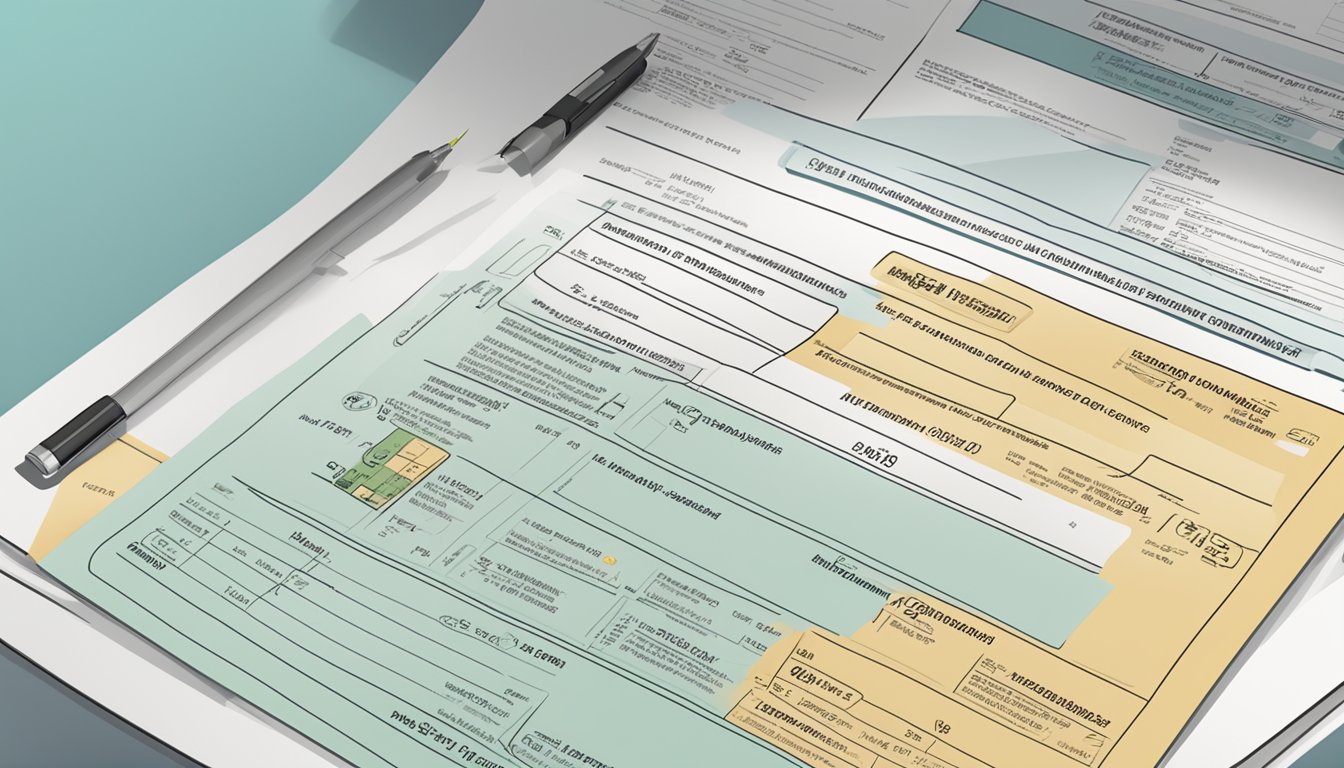
To be eligible for an Employment Pass (EP) in Singapore, you must meet certain requirements. This section will detail the minimum qualifying salary and professional qualifications and experience required for an EP.
Minimum Qualifying Salary
The minimum qualifying salary for an EP in Singapore is $5,000 per month. This salary requirement was raised from $4,500 in September 2022, and it applies to most sectors. However, for those in the financial services sector, the minimum qualifying salary for an EP stands at $5,500.
Professional Qualifications and Experience
In addition to meeting the minimum qualifying salary, you must also possess the necessary professional qualifications and experience to be eligible for an EP. The Ministry of Manpower (MOM) assesses each application on a case-by-case basis, taking into consideration factors such as:
- Your educational qualifications
- Your professional experience
- Your skills and expertise
- The relevance of your work experience to the job you are applying for
Foreign professionals, executives, and technicians who possess relevant qualifications and experience are encouraged to apply for an EP.
It is important to note that meeting the minimum salary requirement and possessing the necessary qualifications and experience does not guarantee approval of your EP application. MOM will consider each application on its own merits and may request additional information or documentation to support your application.
In summary, to be eligible for an EP in Singapore, you must earn a minimum qualifying salary of $5,000 per month and possess the necessary professional qualifications and experience. If you meet these requirements, you are encouraged to apply for an EP and take advantage of the many opportunities available in Singapore.
Application and Renewal Process

If you are planning to work in Singapore, you will need to apply for an Employment Pass (EP) to work legally in the country. The Ministry of Manpower (MOM) is the government agency responsible for approving EP applications. Here is what you need to know about the application and renewal process.
New EP Applicants
To apply for an EP, you need to meet the eligibility criteria set by MOM. One of the key requirements is to earn a minimum monthly salary of $5,000. The salary requirement is higher for certain sectors such as financial services, where the minimum qualifying salary is set at $3,500.
In addition to meeting the salary requirement, you also need to possess the necessary qualifications and work experience. You can apply for an EP online through the MOM website. The processing time for an EP application is usually around three weeks.
Renewal Applications
If your EP is expiring soon and you wish to continue working in Singapore, you need to apply for a renewal. The renewal application process is similar to the initial application process. You will need to meet the same eligibility criteria, including the minimum salary requirement.
To renew your EP, you need to submit an application through the MOM website. The processing time for a renewal application is usually around one week. You should submit your renewal application at least two months before your EP expires.
It is important to note that renewal applications are not guaranteed. MOM will review your application based on your employment history and your employer’s compliance with Singapore’s employment laws. If your renewal application is rejected, you will need to leave Singapore when your EP expires.
In conclusion, the EP application and renewal process can be straightforward if you meet the eligibility criteria and submit a complete application. Make sure to check the latest updates from MOM and comply with Singapore’s employment laws to increase your chances of success.
Economic Impact and Sector-Specific Requirements

When it comes to the Employment Pass minimum salary in Singapore, there are sector-specific requirements that you need to be aware of. These requirements are in place to ensure that the country’s strategic economic priorities are met while also attracting the best talent from around the world.
Financial Services Sector
The financial services sector is one of the most important sectors in Singapore’s economy. As such, the minimum salary requirement for Employment Pass holders working in this sector is higher than in other sectors. Currently, the minimum salary requirement for Employment Pass holders in the financial services sector is $5,500 SGD.
Technology and Science Sectors
The technology and science sectors are also important to Singapore’s economy. To attract the best talent in these sectors, the minimum salary requirement for Employment Pass holders is currently set at $5,000 SGD. This is slightly lower than the requirement for the financial services sector but still reflects the importance of these sectors to the country’s economy.
It’s worth noting that the minimum salary requirements for Employment Pass holders can change over time. For example, the minimum salary requirement for new Employment Pass and S Pass applicants was raised by $500 SGD in September 2022. This change was made to ensure that Singapore remains competitive in attracting and retaining top talent from around the world.
Overall, the Employment Pass minimum salary in Singapore reflects the country’s strategic economic priorities. By setting sector-specific requirements, Singapore can attract the best talent while also ensuring that its economy continues to grow and thrive.
Government Policies and Frameworks
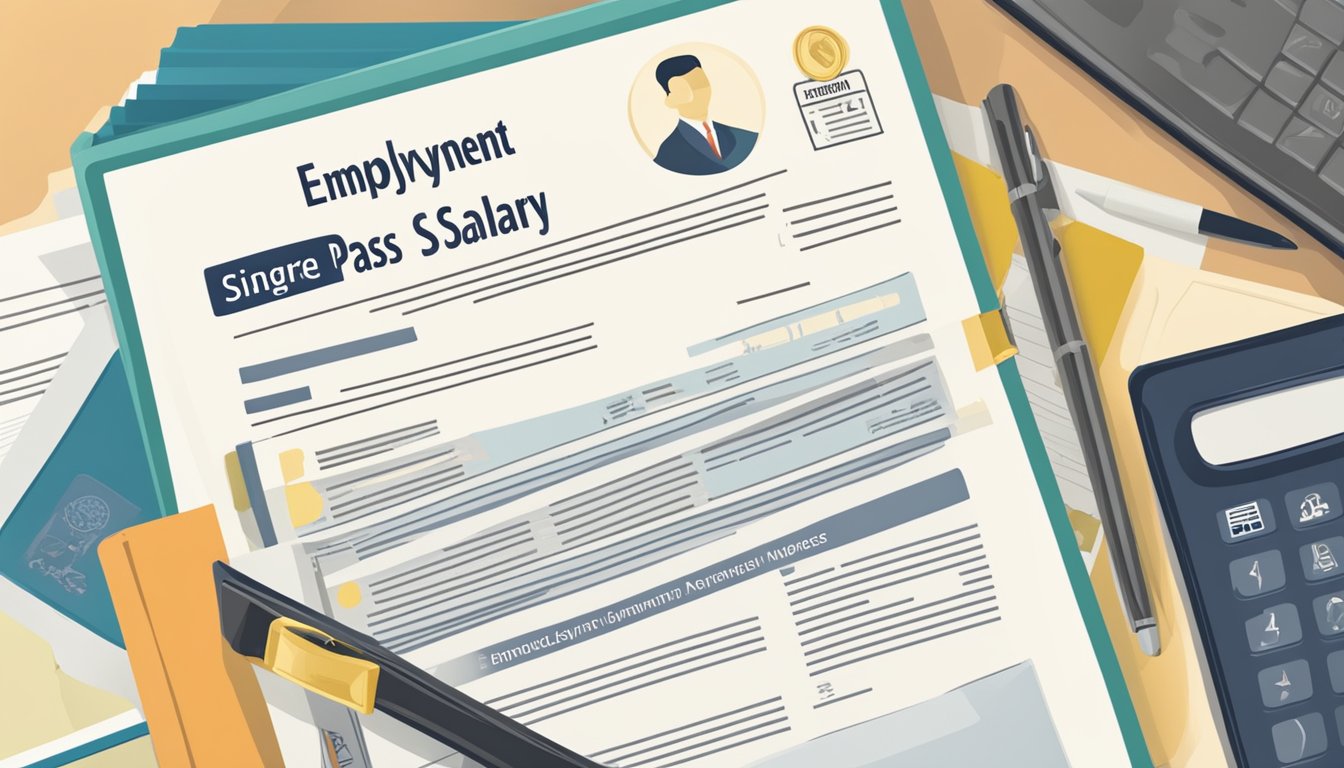
If you are a foreigner looking to work in Singapore, it is important to be aware of the government policies and frameworks that regulate the Employment Pass (EP) system. The EP is a work visa that allows foreign professionals, managers, and executives to work in Singapore.
Fair Consideration Framework
The Fair Consideration Framework (FCF) is a government policy that requires employers to fairly consider Singaporeans for job vacancies before hiring foreigners. The FCF aims to ensure that Singaporeans have equal access to job opportunities and are not disadvantaged by the hiring of foreign workers. The FCF also requires employers to advertise job vacancies on the national job portal, MyCareersFuture.sg, for at least 14 days before they can apply for an EP for a foreign worker.
Complementarity Assessment Framework (COMPASS)
The Complementarity Assessment Framework (COMPASS) is a points-based system that assesses the complementarity between foreign workers and the local workforce. The COMPASS system evaluates factors such as qualifications, work experience, and language proficiency to determine the suitability of foreign workers for the job. The COMPASS system aims to ensure that foreign workers complement, rather than compete with, the local workforce.
The Ministry of Manpower (MOM) oversees the EP system and has implemented various measures to ensure transparency and fairness. For example, employers and employment agents can use the enhanced Self-Assessment Tool (SAT) to check a candidate’s eligibility before they apply for an EP. The SAT assesses factors such as salary, qualifications, and work experience to determine if the candidate meets the EP requirements.
In recent years, the government has raised the minimum monthly salary for EP holders to ensure that they are paid fairly and to prevent the displacement of local workers. From September 2022, the minimum monthly salary for EP holders will be raised to $5,000 for new applicants. The minimum qualifying salary for S Pass holders will also be raised from $2,400 to $2,500, with qualifying salaries for older and more experienced S Pass candidates revised accordingly.
Overall, the EP system is designed to attract foreign talent to Singapore while ensuring that local workers are not disadvantaged. By complying with the government policies and frameworks, you can increase your chances of obtaining an EP and working in Singapore.
Supporting Local Workforce and Employment
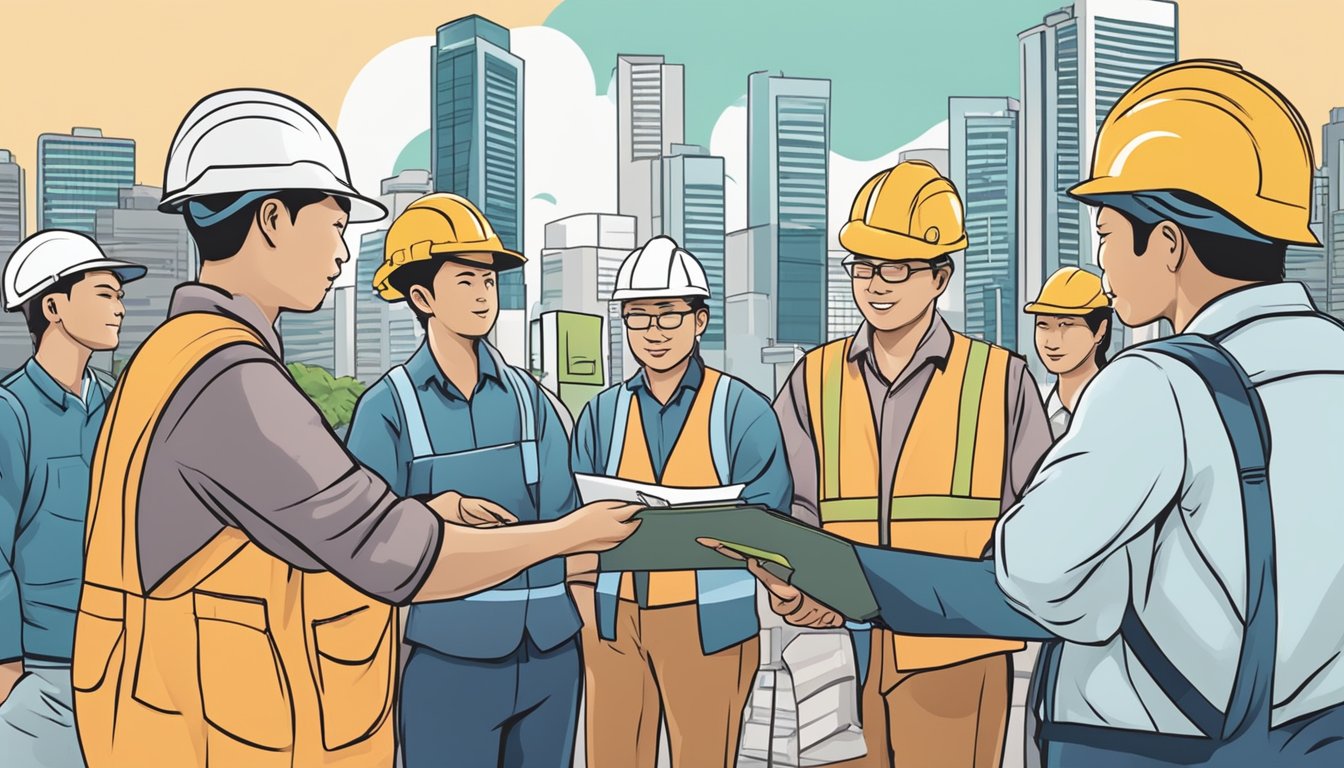
As a foreigner looking to work in Singapore, it is important to understand the country’s commitment to supporting its local workforce and promoting employment opportunities for its citizens. Singapore’s government has implemented various initiatives to ensure that local workers are employed meaningfully and that firms do not use token salaries to access foreign workers.
Local Employment Initiatives
One of the key initiatives aimed at supporting local employment is the Jobs Support Scheme (JSS). This scheme was introduced in 2020 to help employers retain local workers during the COVID-19 pandemic. Under the JSS, the government provides wage subsidies to eligible employers to help offset the cost of local employees’ salaries.
Another initiative is the Jobs Growth Incentive (JGI), which was launched in 2020 to encourage employers to hire more local workers. The JGI provides wage subsidies to employers who hire local workers, with higher subsidies offered for workers aged 40 and above.
Complementarity and Diversity in the Workforce
Singapore’s workforce is diverse, with people from different countries and cultures working together. This diversity is seen as a strength, as it brings different perspectives and skills to the workplace. The government encourages complementarity and diversity in the workforce, which means that foreign workers are employed to complement the local workforce rather than replace it.
To ensure that foreign workers are not taking jobs that could be done by locals, the government has set a minimum salary threshold for Employment Pass (EP) and S Pass holders. This threshold is regularly reviewed and adjusted to ensure that foreign workers are employed only in jobs where there is a genuine need for their skills and expertise.
In conclusion, Singapore’s commitment to supporting its local workforce and promoting employment opportunities for its citizens is evident in the various initiatives implemented by the government. As a foreign worker, it is important to be aware of these initiatives and to understand the country’s approach to complementarity and diversity in the workforce. By working together with local workers, you can contribute to Singapore’s economy and help build a strong and vibrant workforce.
Frequently Asked Questions
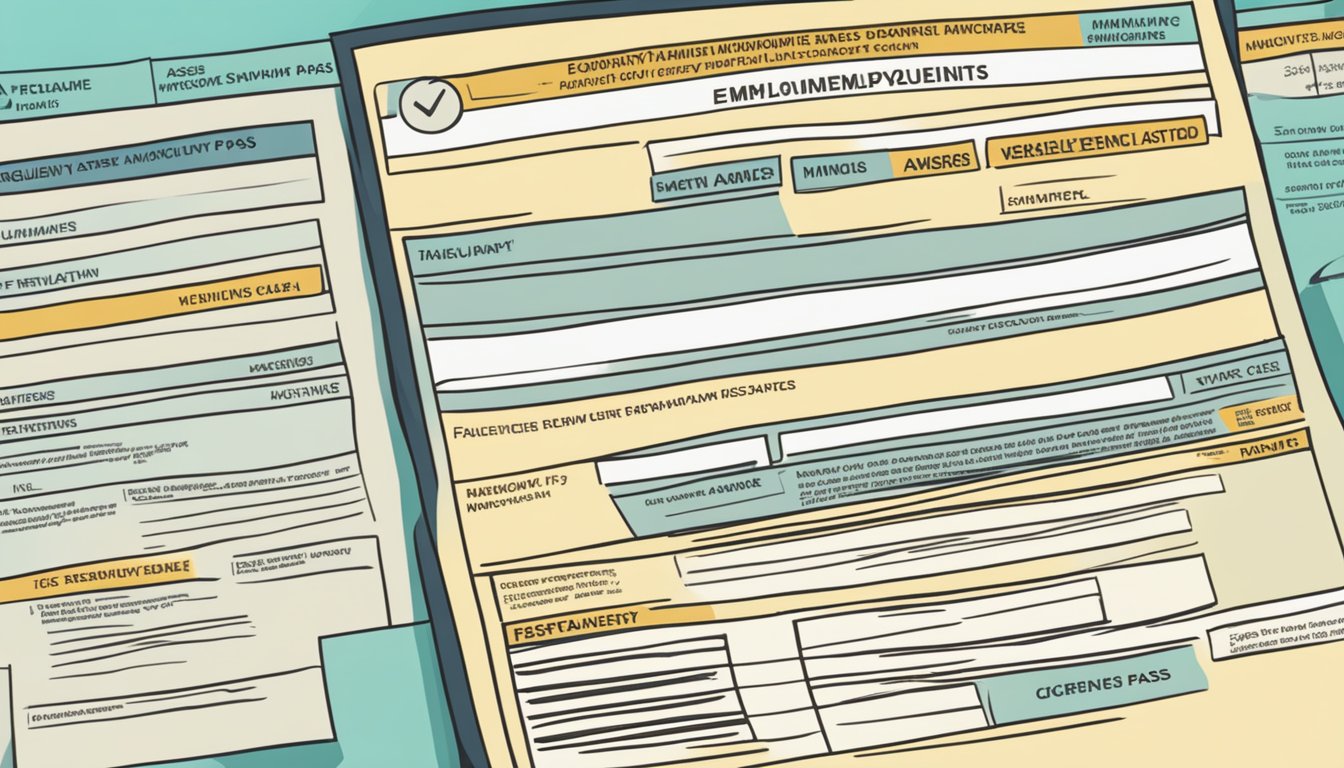
What’s the latest minimum salary criterion for an Employment Pass in Singapore?
The latest minimum salary criterion for an Employment Pass (EP) in Singapore is $5,000 per month. This salary threshold applies to all EP applicants, regardless of their age or qualifications.
How much should one earn to qualify for an S Pass this year?
To qualify for an S Pass this year, one should earn at least $2,500 per month. However, this salary threshold varies depending on the applicant’s qualifications and work experience.
Could you tell me the updated salary threshold for the Singapore Employment Pass?
The updated salary threshold for the Singapore Employment Pass is $5,000 per month. This minimum salary criterion applies to all new EP applicants from 1 September 2023.
What are the salary requirements for a Work Permit compared to an S Pass?
The salary requirements for a Work Permit are lower than those for an S Pass. The minimum salary for a Work Permit holder is $1,400 per month, while the minimum salary for an S Pass holder is $2,500 per month.
Has there been a recent change in the minimum salary for an E Pass in Singapore?
Yes, there has been a recent change in the minimum salary for an EP in Singapore. From 1 September 2023, new EP applicants need to pass the points-based COMPASS in addition to meeting the EP qualifying salary.
What factors can lead to an Employment Pass application being rejected?
Several factors can lead to an Employment Pass application being rejected. These include insufficient work experience, inadequate qualifications, and a low salary offer. Additionally, the Ministry of Manpower may reject an EP application if it believes that the job can be filled by a local candidate.




